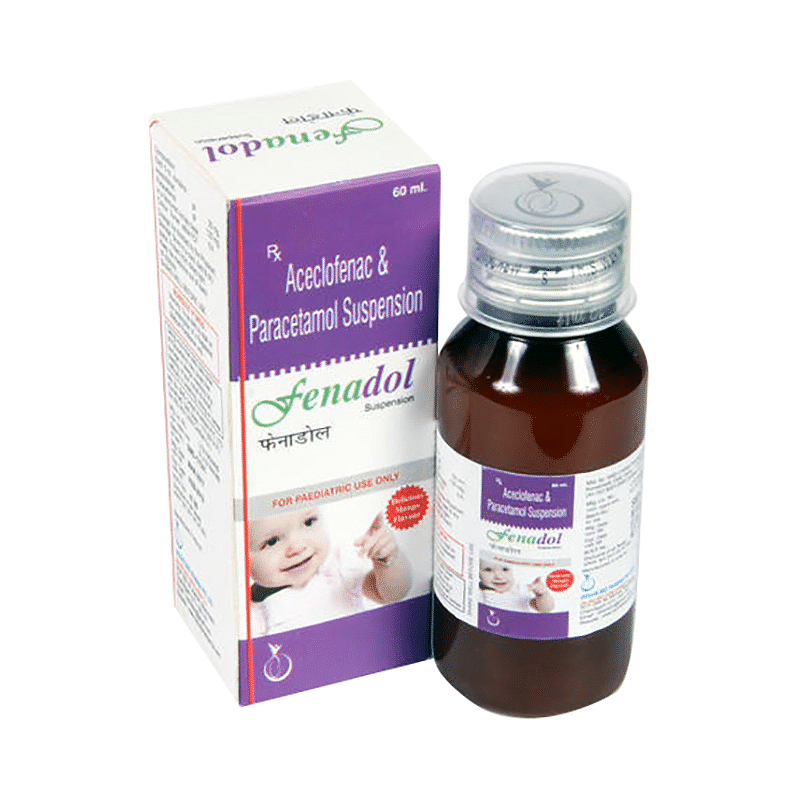
Aginac-P Oral Suspension Mango
Manufacturer
Age Biotech
Salt Composition
Aceclofenac (50mg) + Paracetamol (125mg)
Key Information
Short Description
Aginac-P Oral Suspension Mango helps lower body temperature (fever) and reduce pain and inflammation (redness and swelling) both in infants and children.
Dosage Form
Oral Suspension
Introduction
Aginac-P Oral Suspension Mango is a medicine that helps lower body temperature (fever) and reduce pain and inflammation (redness and swelling) both in infants and children. It is available in the form of an oral suspension and is used to treat various conditions such as fever, pain, and inflammation. The medicine works by blocking the action of chemical messengers responsible for pain, fever, and inflammation.
Directions for Use
Give this medicine after food to avoid abdominal discomfort in your child. Maintain a log of your child's temperature. If you do not see any improvement, contact your child's doctor for advice.
How it works
Aginac-P Oral Suspension Mango comprises two active ingredients: Aceclofenac and Paracetamol. These medicines work by blocking the action of chemical messengers responsible for pain, fever, and inflammation.
Quick Tips
Give plenty of fluids to your child to ensure proper body hydration (water-levels) Give your child a balanced diet Encourage your child to have optimum sleep since sick children get tired soon and getting plenty of rest helps them recover faster Stop the medicine and consult your child's doctor in case your child exhibits allergic rash or stomach pain soon after taking this medicine
Related Medicines

Jcep Oral Suspension

Fenwis-P Oral Suspension

Jemnac Oral Suspension Mango

Moovila P Oral Suspension

Acefan P Oral Suspension

Aceflip P Pediatric Oral Suspension

Btflam Suspension

Fenadol Oral Suspension

Afonac P Oral Suspension

Qukfen-AP Oral Suspension
Frequently asked questions
Can I increase or decrease the dose of Aginac-P Oral Suspension Mango for my child by myself according to the severity of illness?
No, it is not recommended to alter the dosage of the medicine without consulting a doctor. While increasing the dosage without proper judgment may lead to toxicity, decreasing it may cause recurrence of symptoms. Therefore, please discuss any changes in dose with your child's doctor for best results.
How much Aginac-P Oral Suspension Mango should I give to my child?
The appropriate dosage will be determined by your child’s physician based on their individual condition and weight. Adhere strictly to the prescribed dosing schedule as this ensures safe and complete recovery for your child.
How should Aginac-P Oral Suspension Mango be stored?
Aginac-P Oral Suspension Mango should be stored at room temperature, in a dry place away from direct heat and light. Additionally, ensure all medications are kept out of the reach and sight of children to prevent any accidental intake.
Can all children be given the same dose of Aginac-P Oral Suspension Mango?
No, a child’s individual needs will influence the dose prescribed by their doctor. The dosage is determined based on your child's age and body weight, and it may change as they grow older.
When will my child feel better?
It may take several days to a few weeks for your child to show improvement. Continued administration of the medicine at the prescribed dosage and frequency by your doctor is essential for optimal symptom management. If symptoms persist after completing the full course, please consult your doctor immediately.
Are there any serious side effects of this medicine for my child?
While Aginac-P Oral Suspension Mango is generally well-tolerated by children, be vigilant for any concerning symptoms such as persistent vomiting, body swelling, decreased urine frequency, or a severe allergic reaction. In these cases, seek medical attention immediately.
Are there any specific contraindications associated with the use of Aginac-P Oral Suspension Mango?
Aginac-P Oral Suspension Mango is potentially harmful for patients with known allergies to any of its components or excipients, or those allergic to other pain relievers (NSAIDs). It is advisable to avoid this medicine in patients with a history of stomach ulcers, active ulceration/bleeding. It also should be avoided in patients with a history of heart failure, high blood pressure, and liver or kidney disease.


